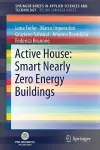
Active House: Smart Nearly Zero Energy Buildings
5 authors - Paperback
£54.99
Lone Feifer holds a Master of Architecture from Royal Danish Academy, and a postgraduate international master in Energy & Green Architecture from Århus School of Architecture and Tsinghua University. He joined VELUX Group in 1999 as architect, where she now serves as director of sustainability & architecture: from her position at VELUX Group she leads the international Active House Alliance, a global member organization of planners, producers and knowledge institutions in the building industry. Active speaker and advisor on sustainability, design and innovation, and education, she is member of the board of Danish Architects Association and of Danish Design Council.
Prof. Marco Imperadori is full professor of Building Engineering at Politecnico di Milano, Italy. Lecturer and visiting professor in many universities and institutions worldwide, his research interests focus on high energy-efficient buildings, structure/envelope building systems, and sustainability. He was responsible for Politecnico di Milano in the building Resilience Network Android (EU-LLP), and currently serves as Rector’s Delegate for the Far East representing Politecnico di Milano in Asia. He represents Politecnico di Milano in the Active House Alliance board of advisory committee.
Dr. Graziano Salvalai is assistant professor of Energy Efficient Buildings and Building Engineering at Politecnico di Milano, Italy, where he is member of the research group RE3_Lab (REfurbishment and Energy Efficiency Lab). He was visiting scientist at Fraunhofer Institute for Solar Energy System in Freiburg (Germany) and at National Renewable Energy Lab - NREL, Golden, Colorado (USA). His research interests focus on innovative technology solution for energy efficient buildings.
Dr. Arianna Brambilla is lecturer of Architectural Technology at University of Sydney, NSW, Australia. She holds a PhD in Building Physics and Systems from Politecnico di Milano, Italy, with a thesis on Active House in Mediterranean climate which investigated building strategies to enhance resilience to climate change and users’ interaction with the building automation system, applied to very efficient model homes. Her research interests focus on the perceived and subjective thermal comfort in relation to the objective environmental comfort, hygro-thermal performance of building components and materials, low-carbon design strategies and thermal energy storage.
Federica Brunone is a construction engineer and PhD student in Construction Systems and Processes at Politecnico di Milano, Italy. During her graduation she was a guest researcher at i.lab Reseach and Development department of Italcementi Group, developing new and innovative materials. Since 2015 she has carried out research activities at VELUXlab laboratory of Politecnico di Milano, in the field of integrated building design between comfort, environmental impact, and energy saving.